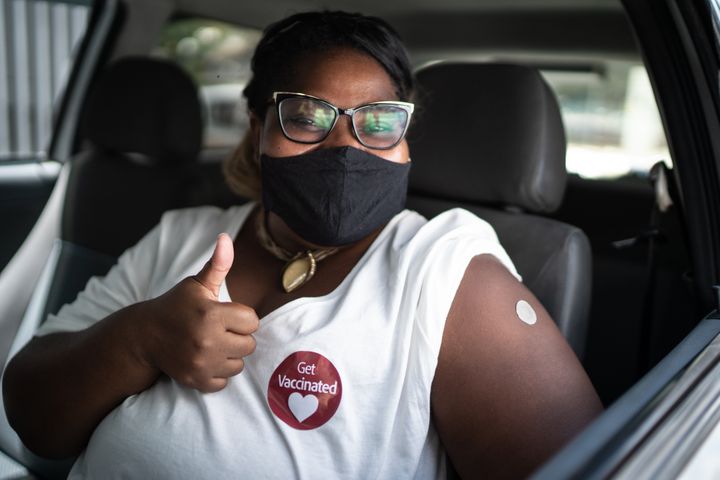News
Why You Shouldn
In many states, securing a COVID-19 vaccination appointment is a messy process that requires hours of sitting next to a computer and refreshing the page until, miraculously, a free time slot for a vaccine opens up.
Scooping up a much-coveted vaccine appointment essentially comes down to luck, and when you’re eligible to get vaccinated, you shouldn’t feel guilty that you’re one of the lucky ones who got through.
If you’re struggling deciding whether it’s “morally right” to get the shot when so many other high-risk people are having difficulty booking an appointment, know that you deserve the shot just as much as any other qualifying person.
It doesn’t matter if you’re eligible because of your age, a chronic medical condition like cancer or diabetes, your BMI or the fact that you smoke. If the system says it’s your turn, you should feel guilt-free and confident about getting vaccinated. By doing so, you’re not only protecting yourself, but people in your community as well.
Here’s why you don’t need to feel guilty about getting the shot when it’s your turn and how to deal if you do feel uneasy:
COVID-19 is unpredictable.
COVID-19 is a confusing and variable disease. Though it’s typically more severe in older people and those with chronic medical conditions, it also strikes younger people who are generally healthy. It even spares people who are categorized as being very high-risk.
There’s no way to predict how the coronavirus will behave in any given person, so if you qualify, assume you have some level of risk and that the vaccine will provide some much-needed and deserved protection.
“This is one of the tough things about this virus … we haven’t had the evidence and data to really help us understand who might be most at risk for what,” said Benjamin F. Miller, a primary care psychologist and an adjunct professor at Stanford School of Medicine. We have learned that certain populations are more vulnerable, but it’s not a simple, clear-cut algorithm.
Because of this, “it’s hard to know who is at the most exquisite risk,” added Robert Amler, the dean of the School of Health Sciences and Practice at New York Medical College and a former chief medical officer at the Centers for Disease Control and Prevention. Health officials have designed the tiers off of the best available evidence, and though criteria could change as we learn more about the coronavirus, there is a real reason certain types of people are eligible.
“Once you are eligible, you are as legitimate as anyone else who is eligible,” Amler said. If you find an open appointment, take it, Amler added. Vaccines could be in short supply again and you might not get another chance for a few weeks.
You are protecting others by getting the vaccine, too.
The other huge benefit is that you’re helping our society reach herd immunity, which occurs when about 70% of the population is immune — either through a vaccine, natural infection or pre-existing immunity. By accepting a shot as soon as its your turn, you’re helping build immunity in the population so that the coronavirus has trouble finding new people to infect.
“The more people are vaccinated, the closer we get to the day where the virus has no further place to go, no further person to attack,” Amler said.
Miller compared getting the vaccine to wearing a mask. “It protects you, but also other people,” Miller said.
What to do if you’re experiencing a lot of guilt
If you’re at the vaccination site and feel the guilt bubbling up, stay in line. “There’s a reason you were eligible for this. Don’t question the decisions of public health authorities or the science, just get back in line. It’s better for all of us for you to get vaccinated,” Miller said.
If you show up and feel like you’re catching glares from other people, remember that it is your turn — fair and square. And it’s no one’s business what qualifies you for the vaccine.
“They should just be confident they are entitled to their privacy, and if they’ve been named as eligible and they’ve been given an appointment, they should go ahead and get vaccine,” Amler said.
If you continue to feel guilty after vaccination, consider doing something about it. If you got an appointment because you’re tech savvy, consider helping older people in your community who might not know how to work a computer to get an appointment. Attend a virtual meeting in which you can advocate for certain at-risk groups, or talk about how your experience can be used to improve the vaccination process for others. “Your voice is a powerful tool,” Miller said.
You should also try to open up about the guilt you’re feeling. “The worst thing we can do when we’re experiencing any type of emotion is to just let stay inside,” Miller said. Talk to your friends and family about how you feel, and if that makes you uncomfortable, journal.
You’ll likely find there are a lot of people out there who feel the exact same way. “There is nothing more therapeutic than being in the same boat with other folks and experiencing things together,” Miller said.
Read more

